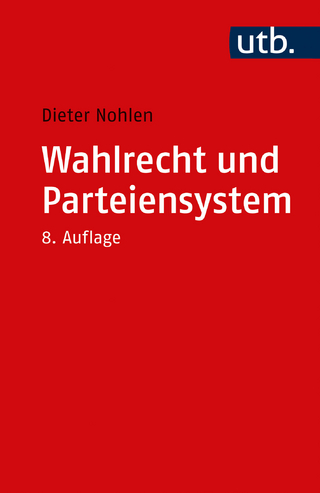
Political Ideologies and the Democratic Ideal
Routledge (Verlag)
978-1-032-20447-5 (ISBN)
- Noch nicht erschienen (ca. Oktober 2024)
- Versandkostenfrei innerhalb Deutschlands
- Auch auf Rechnung
- Verfügbarkeit in der Filiale vor Ort prüfen
- Artikel merken
Now in its twelfth edition, Political Ideologies and the Democratic Ideal continues the book's tradition of offering a clear, concise and comprehensive introduction to the ideas and ideals that shake and shape our political world. The text outlines a framework defining each ideology in terms of the four functions ideologies performs — explanation, evaluation, orientation, and political program — allowing students to compare, contrast, and analyze the various ideologies, developing their own unique views and critical thinking skills.
New to this Edition
A new co-author, Jennet Kirkpatrick, recognized for her teaching and scholarship in political theory, feminist theory and resistance.
Chapter 2; updated material on voter suppression and populism.
Chapter 3; expanded discussion of the relationship between Adam Smith’s moral and economic theories; how John Stuart Mill’s views on free speech might apply to contemporary controversies; differences between John Rawls and Robert Nozick, and between neoclassical and welfare liberals more generally. Updated; discussion of the “Great Recession” and broader issues of economic inequality.
Chapter 4; extended discussion of Edmund Burke’s place within the conservative tradition. Updated; assessment of contemporary conservatism in light of Donald Trump’s presidency; new section on Christian Nationalism.
Chapter 5; extended discussion of Marx’s theory of history.
Chapter 6; updated the status of the socialist and communist traditions in China, Russia, and the United States.
Chapter 7; charted the resurgence of far right and neo-fascist politics in Europe. Discussion of the “Alt-Right” in the United States has been expanded, including new sections on QAnon and the “Great Replacement” theory. Also expanded upon; discussion of whether fascism could gain serious traction in the U.S., and a new section on the reasons why some critics say Donald Trump is either a fascist, or dangerously close to becoming one.
Chapter 8; updated sections on Black liberation and feminism, including reference to George Floyd’s murder and the Dobbs decision that overturned Roe v. Wade. Also, new material on settler colonialism and on the issues for all liberation ideologies raised by the case of undocumented immigrants, and extended discussion of liberation theology.
Chapter 9; updated material on the severity of the climate crisis, and the variety of responses that have emerged to address it.
Chapter 10; a new section on Hamas, and extended discussion of protests against Islamist rule in Iran focusing on the responses to Mahsa Amini’s death in police custody. Also updated; sections on ISIS and the Taliban in light of the former’s erosion and the latter’s return to power, in addition to references to internecine conflicts among radical Islamists.
Chapter 11; updated reasons for the conclusion that there will be no end of ideological conflicts soon, especially with the continued power of religious worldviews, globalization, and---perhaps most especially---the return of fascism worldwide.
Terence Ball received his Ph.D. from the University of California at Berkeley and is now Emeritus Professor of Political Science and Philosophy at Arizona State University. He taught previously at the University of Minnesota and has held visiting professorships at Oxford University, Cambridge University, and the University of California, San Diego. His books include Transforming Political Discourse (1988), Reappraising Political Theory (1995), and a mystery novel, Rousseau’s Ghost (1998). He has also edited The Federalist (2003), James Madison (2008), Abraham Lincoln: Political Writings and Speeches (2013), and coedited The Cambridge History of Twentieth-Century Political Thought (2003). Richard Dagger earned his Ph.D. from the University of Minnesota and has taught at Arizona State University and Rhodes College, and the University of Richmond, where he is currently the E. Claiborne Robins Distinguished Chair in the Liberal Arts. He is the author of many publications in political and legal philosophy, including Civic Virtues: Rights, Citizenship, and Republican Liberalism (1997) and Playing Fair: Political Obligation and the Problem of Punishment (2018). Daniel I. O’Neill received his Ph.D. from the University of California, Los Angeles, and is currently Professor of Political Science at the University of Florida. He is the author of The Burke-Wollstonecraft Debate: Savagery, Civilization, and Democracy (2007); co-editor of Illusion of Consent: Engaging with Carole Pateman (2008); and author, most recently, of Edmund Burke and the Conservative Logic of Empire (2016). From 2017-2023 he co-edited one of the flagship journals of the American Political Science Association, Perspectives on Politics. Jennet Kirkpatrick holds a Ph.D. from Rutgers University and is now an associate professor in the School of Politics and Global Studies at Arizona State University. She is the author of The Virtues of Exit and Uncivil Disobedience. She has published articles in Political Theory, The Review of Politics, Dissent, Theoria, Politics, Groups, and Identities, Contemporary Political Theory, American Political Thought, and Perspectives on Politics. In addition to her interest in resistance, Professor Kirkpatrick also teaches and writes about morality and politics, and feminist theory.
Part 1. Ideology and Democracy 1. Ideology and Ideologies 2. The Democratic Ideal Part 2. The Development of Political Ideologies 3. Liberalism 4. Conservatism 5. Socialism and Communism: From More to Marx 6. Socialism and Communism After Marx 7. Fascism Part 3. Political Ideologies: Today and Tomorrow 8. Liberation Ideologies and the Politics of Identity 9. "Green" Politics: Ecology as Ideology 10. Radical Islamism 11. Postscript: The Future of Ideology
| Erscheint lt. Verlag | 29.10.2024 |
|---|---|
| Zusatzinfo | 10 Tables, black and white; 14 Line drawings, black and white; 26 Halftones, black and white; 40 Illustrations, black and white |
| Verlagsort | London |
| Sprache | englisch |
| Maße | 178 x 254 mm |
| Themenwelt | Geisteswissenschaften ► Philosophie |
| Sozialwissenschaften ► Politik / Verwaltung ► Politische Systeme | |
| Sozialwissenschaften ► Politik / Verwaltung ► Politische Theorie | |
| ISBN-10 | 1-032-20447-8 / 1032204478 |
| ISBN-13 | 978-1-032-20447-5 / 9781032204475 |
| Zustand | Neuware |
| Haben Sie eine Frage zum Produkt? |
aus dem Bereich


